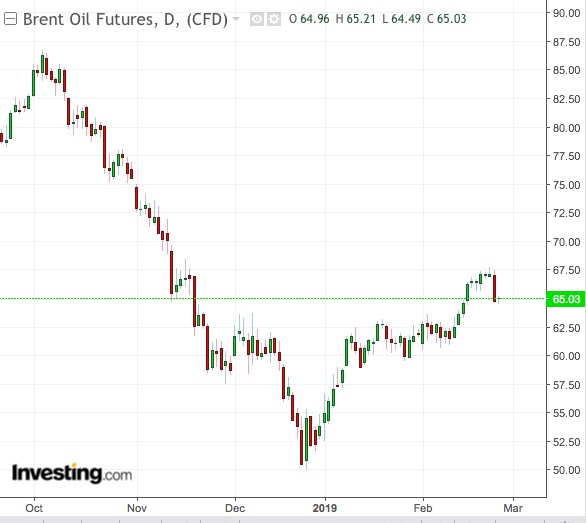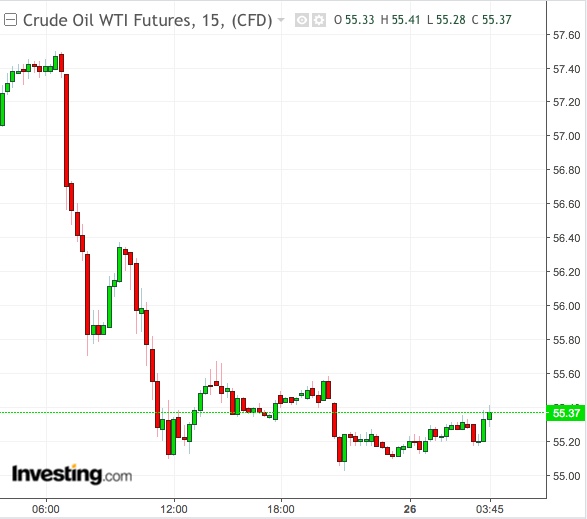It's the oil market equivalent of one of Hollywood’s most famous movie taglines: “Just when you thought it was safe to go back in the water …”
That promo was for the 1978 classic “Jaws 2”, which tells of the second coming of a great white man-killing shark. Monday’s scare in the oil market involved a different kind of predator: a U.S. president back to kill a rally in crude prices after destroying one just months ago.
Amid preparations for nuclear talks with North Korea's leader, Trump found time early on Monday to tweet that oil prices were too high and that the Organization of the Petroleum Exporting Countries should work on bringing them lower.
The result: a plunge of more than 3 percent in both New York-traded West Texas Intermediate crude and London’s Brent oil. The plunge short-circuited the broad rally of the past fortnight, leaving Brent with its sharpest one-day loss in two months.
For those who need to be reacquainted with the Trump tweeting saga and oil, here are the facts:
Trump ran an unofficial White House campaign against pricey oil with his tweets last year, as fears of short supply from U.S. sanctions on Iranian oil exports and production cuts by the Saudi-led OPEC and Russia drove WTI to nearly $77 a barrel and Brent above $86.
The OPEC+ alliance decided last summer to suspend its production cuts and expand supplies to appease the president, who had appeared worried about the fragile U.S. economic recovery and the impact of high pump prices on midterm elections last November.

But right after the output cuts stopped, the president unexpectedly authorized waivers on the Iranian export sanctions, fuelling fears of excess supplies instead. Consequently, WTI and Brent lost about 40% between early October and Christmas.
A frustrated OPEC+ decided in early December to reintroduce production cuts from January. These, combined with new sanctions on Venezuelan oil introduced by the Trump administration, helped crude prices bounce back more than 20% this year. To his credit, Trump did not issue a single tweet on oil in the past two months. Then suddenly on Monday, he was back.
Trump Warns OPEC Prices Are Too High - This Time Helped By Anti-Trust Laws
Trump’s latest salvo read:
The tweet was enough to keep oil prices down in Tuesday’s Asian trading, as traders and analysts debated on the longer-term repercussions of Trump’s renewed battle with OPEC.
Some worry that the president has a bigger weapon in his hand this time: lawsuits against producers conspiring to cut production.
A U.S. Congressional panel approved on February 7 the No Oil Producing and Exporting Cartels Act (NOPEC), which allows the Justice Department to target any state for acting “collectively or in combination with any foreign state” to “limit production or distribution of oil, natural gas or product” and attempting “to set or maintain a price” for those commodities. The law strikes at the heart of OPEC’s coordinated supply cuts of the past 60 years to raise prices.
ANZ Bank said in a research note that Trump’s warning to OPEC
“carries more weight this time around, with U.S. legislators resurrecting a bill that would make the organization subject to antitrust laws.”
New Round Of Iranian Sanction Waivers?
John Kilduff, founding partner at New York energy hedge fund Again Capital, spoke of another potential Trump decision that OPEC might find just as distressing: a new round of sanction waivers against Iran that could flood the market with more oil just as U.S. production hits world highs of 12 million bpd.
Tanker-tracking data show Iran’s crude exports averaged 1.25 million barrels per day in February, after January levels of 1.1-1.3 million bpd, versus the below 1-million-bpd forecast by the market.
Said Kilduff in an interview with CNBC:
"When you read into the implication of [Trump's tweet], it's twofold. First you have to believe the Saudis are going to take note. They have in the past.”
"And then you have to believe that another round of waivers on the Iran sanctions has to be on the table, and I think that's the secondary implication from that tweet."
OPEC itself has not reacted to Trump’s latest tweet.
When the cartel announced in December that it was cutting production again to boost prices, Saudi Energy Minister Khalid al-Falih said—giving the impression that Trump wasn’t too important to the group:
“The president of the United States is just one person among many we have to consider when deciding on oil supplies.”
OPEC Won’t Be Bullied, Say Some
Scott Shelton, energy futures broker at ICAP in Durham, N.C, is among those who think OPEC will stand its ground.

That crude prices fell as much as they did on Trump's tweet "is absolutely silly," Shelton said on Monday. But he also believed the market has overextended itself and needs to correct, adding:
“I would think that WTI could see itself back under $55, with only a bullish inventory report generating enough buying to offset it."
Phil Flynn at The Price Futures Group brokerage in Chicago is another who believes OPEC will not allow itself to be bullied again by Trump.
Said Flynn:
“OPEC is showing no signs of raising output, as they have slashed it to 30.83 million bpd in January, a four year-low. President Trump can tweet all he wants, but he has few options to get the cartel to change their oil-cutting ways.”
